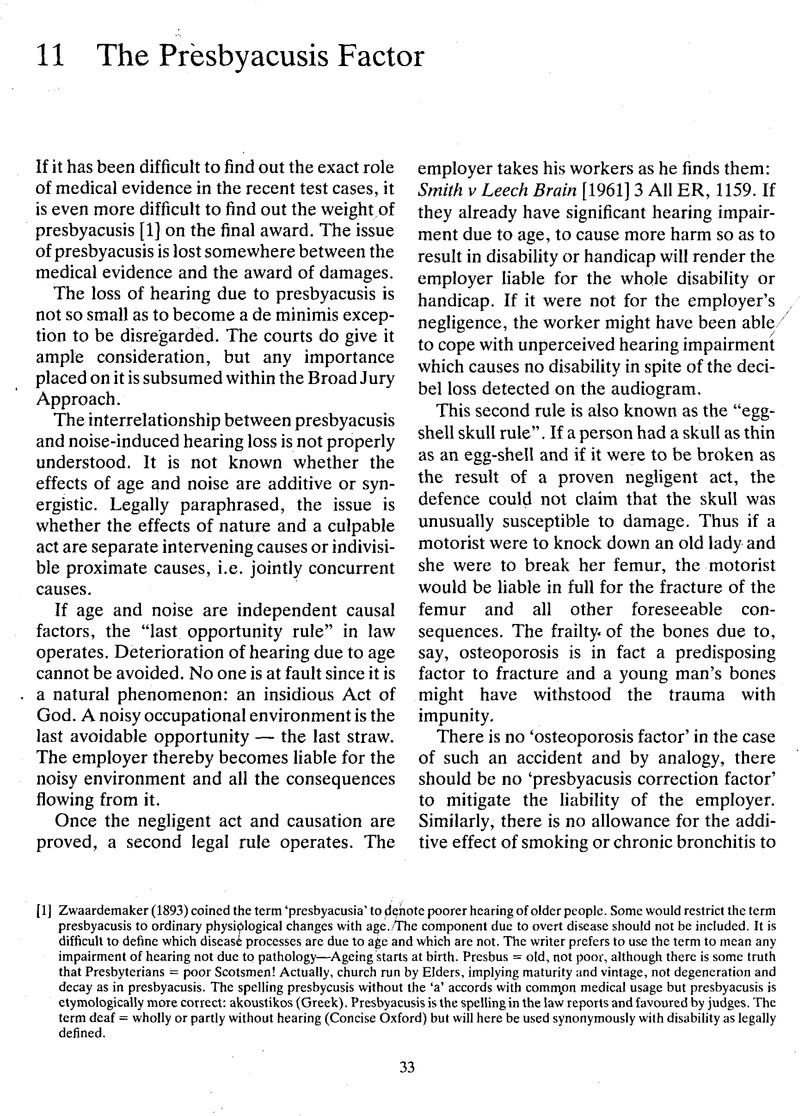No CrossRef data available.
Article contents
11 The Presbyacusis Factor
Published online by Cambridge University Press: 09 November 2023
Abstract

- Type
- Other
- Information
- The Journal of Laryngology & Otology , Volume 100 , Issue S11: Forensic Audiology , 1986 , pp. 33 - 36
- Copyright
- Copyright © JLO (1984) Limited 1986
References
[1] Zwaardemaker (1893) coined the term ‘presbyacusia’ to denote poorer hearing of older people. Some would restrict the term presbyacusis to ordinary physiological changes with age. The component due to overt disease should not be included. It is difficult to define which disease processes are due to age and which are not. The writer prefers to use the term to mean any impairment of hearing not due to pathology—Ageing starts at birth. Presbus = old, not poor, although there is some truth that Presbyterians = poor Scotsmen! Actually, church run by Elders, implying maturity and vintage, not degeneration and decay as in presbyacusis. The spelling presbycusis without the ‘a’ accords with commpn medical usage but presbyacusis is etymologically more correct: akoustikos (Greek). Presbyacusis is the spelling in the law reports and favoured by judges. The term deaf = wholly or partly without hearing (Concise Oxford) but will here be used synonymously with disability as legally defined.
[2] Transposing the received wisdom “No liability without fault”. The situation is analogous to the anecdbtal last man who befriended a promiscuous lass and was held responsible for the baby because earlier culprits (strictly, culprit in the singular) were not traceable.
[3] Mr Justice Popplewell in Kellett v British Rail Engineering Ltd, 3rd May, 1984 at the High Court at Chester, Queen's Bench Division. O.B.Popplewell QC appeared for the Metropolitan Police Receiver in McCafferty [1977].
[4] The six claimants in Thompson were awarded £1350, £1250 plus £295 hearing aid, £850, £850, £600 and £250 plus £650 against two employers. These were lowish awards compared to the £5,000 average for significant cases.
[5] As in Germany, speech audiometry is also used. Austrian compensation philosophy is based on loss of earning capacity, but in practice this roughly equates with disability. The German attempt of correlate discrimination loss with (3 × H500 + 2 × H1000 + H2000)+6 had to be modified across the border to account for variations in accent (Roser, 1963; Konig, 1966; Surbock, 1971).
[6] Presbyacusis Correction is more accurately called “Presbyacusis Subtraction”.


